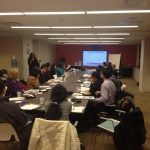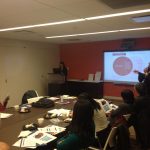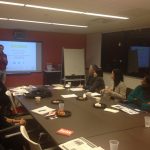On October 16, 2019, NYC Health + Hospitals issued a Press Release announcing a series of free health insurance workshops to prepare New Yorkers for the upcoming open-enrollment periods.
Workshops are open to the public to help residents understand the best health plan options for individuals and families. For people with Medicare, open enrollment begins October 15 and ends December 7, 2019. This is the seventh consecutive year NYC Health + Hospitals and CMS are partnering to bring free workshops to communities across New York City.
Collaborating with the Centers for Medicare & Medicaid Services (CMS), the workshops will help community partners, faith-based organizations, caregivers, and community members understand health insurance options available to them as they prepare for the open-enrollment periods for Medicare and New York State of Health, the State’s official online marketplace. This is the seventh consecutive year NYC Health + Hospitals and CMS are partnering to bring free workshops to communities across New York City. The collaboration with CMS builds on the City’s commitment of Guaranteed Care, ensuring that all New Yorkers have access to affordable, high-quality care.
“You can only make the right decisions on health insurance for you and your family if you have all the information,” said Mitchell Katz, MD, President and CEO, NYC Health + Hospitals. “There are many factors that one should consider before selecting health insurance, from family needs to individual health needs, so I encourage New Yorkers to take advantage of this free information. For those looking to apply for health insurance, our staff can help you get connected with information, and for those not eligible for coverage or unable to afford it, we can help you get enrolled in NYC Care or NYC Health + Hospitals’ Options.”
“With open enrollment coming up, training our community partners and community members about Medicare, Medicaid, and private health insurance is as important as it has ever been,” said Frank Winter, Partnership Manager, CMS New York Regional External Affairs Office. “Medicare Advantage premiums in New York are down by an average of more than $2 a month, and with improved tools on medicare.gov to help beneficiaries compare coverage options, it’s a great time to shop around. Our workshops help explain what’s out there and we provide tools and resources to resolve issues that come up relating to health insurance coverage going into Medicare open enrollment and open enrollment for the New York State of Health.”
“Health insurance is complicated and it can be difficult to know which plan you need,” said Assembly Health Committee Chair Richard N. Gottfried. “These workshops will be helpful for New Yorkers trying to understand their options during the open enrollment period, and I applaud NYC Health + Hospitals, CMS, and their community partners for organizing these events.”
“Every New Yorker who is eligible for insurance needs to know the options that are available to them, and I want to thank NYC Health + Hospitals for hosting these free workshops. Having medical experts and community organizers available to assist individuals and answer questions about different insurance options, particularly regarding Medicare and Medicaid, will go a long way towards demystifying what can be a very confusing process for many,” said Councilwoman Carlina Rivera, Chair of the Council’s Committee on Hospitals.
Health insurance specialists from CMS will provide updates on Medicare parts A, B, C, and D, Medicaid basics, preventive services, enrollment assistance and resources for the uninsured, and more. Workshops are open to community partners, faith-based organizations, caregivers, community members, and NYC Health + Hospitals’ staff.
Below is the schedule of workshops:
Tuesday, October 22, 2019 from 8:30AM – 1:00PM
NYC Health + Hospitals/Gotham Health, Cumberland
100 N. Portland Avenue
Brooklyn, NY 11205
Register Here
Tuesday, October 29, 2019 from 8:30AM – 1:00PM
NYC Health + Hospitals/Elmhurst
79-01 Broadway
Elmhurst, NY 11373
Register Here
Thursday, November 7, 2019 from 8:30AM – 1:00PM
NYC Health + Hospitals/Lincoln
234 E. 149th Street
Bronx, NY 10451
Register Here
Thursday, November 14, 2019 from 8:30AM – 1:00PM
NYC Health + Hospitals/Carter
1752 Park Avenue
New York, NY 10035
Register Here
With the exception of people with Medicare, the next open enrollment period for New York State of Health, when residents will be able to either change their insurance plan, or enroll in health insurance for the first time, will start on November 1, 2019. For people with Medicare, the annual enrollment period began as of October 15, 2019, and ends December 7, 2019. During this time, people with Medicare can select a Medicare Advantage plan or prescription drug plan. They can also switch plans if they are already enrolled.
Registration is free and required in advance of the event. Light refreshments will be served, and attendees will have the chance to win a fitness tracker. Participants may also register by calling: 212-788-3450.
About NYC Health + Hospitals
NYC Health + Hospitals is the largest public health care system in the nation serving more than a million New Yorkers annually in more than 70 patient care locations across the city’s five boroughs. A robust network of outpatient, neighborhood-based primary and specialty care centers anchors care coordination with the system’s trauma centers, nursing homes, post-acute care centers, home care agency, and MetroPlus health plan—all supported by 11 essential hospitals. Its diverse workforce of more than 42,000 employees is uniquely focused on empowering New Yorkers, without exception, to live the healthiest life possible. For more information, visit https://protect2.fireeye.com/url?k=95fbe379-c9affa05-95fbd246-0cc47adc5fa2-b04c5509b05543c4&u=http://www.nychealthandhospitals.org/ and stay connected on Facebook at https://www.facebook.com/NYCHealthandHospitals or Twitter at @NYCHealthSystem.
About The Centers for Medicare & Medicaid Services
The Centers for Medicare & Medicaid Services (CMS) is a branch of the U.S. Department of Health and Human Services. CMS is the federal agency which administers Medicare, Medicaid, the Children’s Health Insurance Program and parts of the Affordable Care Act. CMS provides information for health professionals, local governments, consumers and other stakeholders. For more information about CMS, visit www.cms.gov. For more information about the CMS, visit www.cms.gov. For more information on the New York State of health visit www.nystateofhealth.ny.gov.










